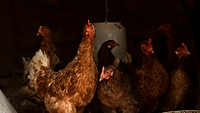Detection of Foodborne Bacteria Resistant to Last-Resort Carbapenem Antibiotics on the Rise in EU

Image credit: Freepik
The European Food Safety Authority (EFSA) has alerted the public that pathogens resistant to last-resort carbapenem antibiotics are increasingly being found in food animals and food products.
According to a new EFSA scientific opinion, carbapenemase‐producing foodborne bacteria have been detected in the food chain in 14 out of 30 EU/European Economic Area (EEA) countries since 2011 (namely, Austria, Belgium, Czechia, Germany, Greece, Hungary, Italy, Norway, the Netherlands, Portugal, Romania, Spain, Sweden and Switzerland). Carbapenemase-producing bacteria produce carbapenemases enzymes that inactivate carbapenem antibiotics, which are critical drugs used to treat serious infections in humans.
Antimicrobial resistance (AMR) is recognized by the World Health Organization (WHO) as one of the ten top health challenges facing humanity in the 21st century, with some reports (the 2016 O’Neill report) estimating that 300 million people will die prematurely due to infection by drug-resistant bacteria by 2050, globally. More specifically, resistance to last-resort carbapenem antibiotics poses a significant public health risk, potentially leaving few effective treatment options for seriously ill people.
The emergence of carbapenemase‐producing foodborne bacteria in Europe began in German pigs in 2011. Detections of carbapenem resistance have since risen in all food-producing animals and foods, but most especially in pigs.
As of 2025, the most frequently reported carbapenem-resistant bacteria are Escherichia coli, Klebsiella, and Salmonella, mostly originating from meat-producing terrestrial livestock (i.e., pigs and cattle), and to a lesser extent, poultry. These food animals are routinely monitored for AMR in the EU. In general, a notable increase in the number of carbapenem-resistant bacteria has been observed, especially in pigs, with significant surges in Italy in 2021, as well as Spain and Portugal in 2023. Occasional detections have been noted in meat products. Additionally, although very few studies have investigated carbapenem resistance in foods of aquatic animal origin and foods of non-animal origin, those studies have nonetheless reported the presence of carbapenemase‐producing bacteria.
While there is no definitive evidence that carbapenemase‐producing bacteria spread to humans through food, identical strains have been found in both animals and humans, suggesting possible transmission. For example, the emergence of human cases of carbapenemase-producing Salmonella enterica in the EU in 2022 and 2023 suggests a food-producing origin, even though related carbapenemase‐producing S. enterica was not detected in the food chain during the same period. Additionally, in some cases, common plasmids have been found in both animal and human bacteria.
Contingency plans for controlling carbapenemase‐producing foodborne bacteria have been established in ten EU/EEA countries, six of which have already detected carbapenem resistance in the food chain (Germany, Italy, the Netherlands, Norway, Sweden, and Spain). Denmark, Finland, Lithuania, and Malta have not yet reported the occurrence of any carbapenemase-producing bacteria.
To mitigate the occurrence and spread of carbapenemase‐producing foodborne bacteria, EFSA recommends expanding monitoring activities to food sources that are not currently routinely monitored (e.g., seafood products and vegetables), as well as to additional bacterial species (e.g., Klebsiella). EFSA also calls for improved detection methods, as well as the use of traceback investigations and molecular typing to identify transmission routes, including potential spread via workers and animal feed. Finally, EFSA recommends studies designed to gain a better understanding of how carbapenemase‐producing bacteria spread in the food chain.
Looking for a reprint of this article?
From high-res PDFs to custom plaques, order your copy today!






